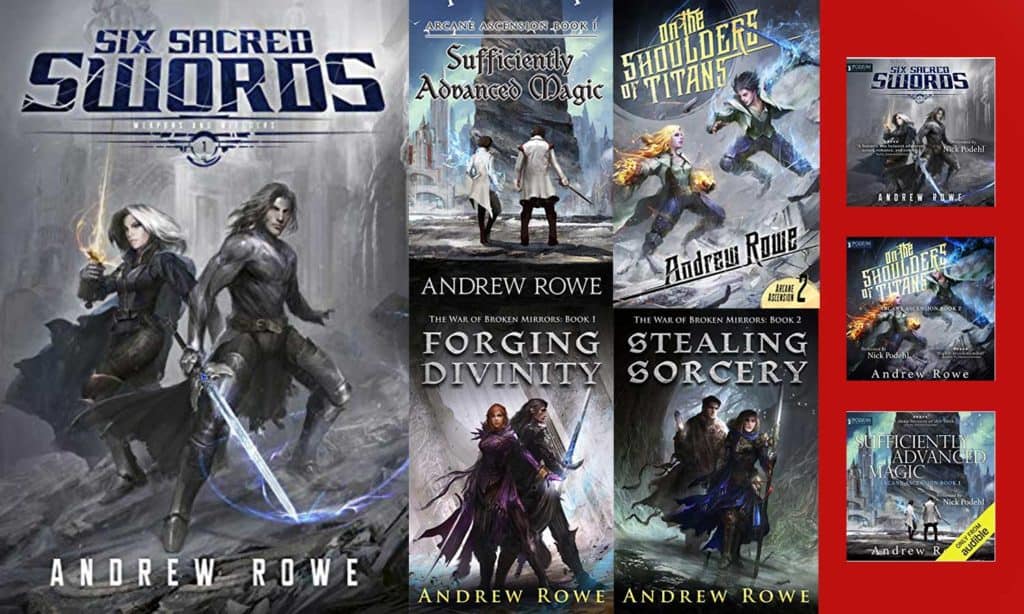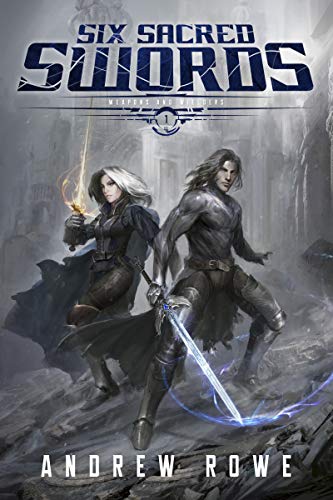Andrew Rowe is a professional game designer. He’s also worked at awesome companies like Blizzard Entertainment, Cryptic Studios, and Obsidian Entertainment. When he’s not crunching numbers for game balance, he runs Shades of Venaya, a swords and sorcery themed live-action role-playing game. In addition, he writes for pen and paper role-playing games. Aside from game design and writing, Andrew watches a lot of anime, reads a metric ton of fantasy books, and plays every role-playing game he can get his hands on. Check out his blog and find him on Facebook.
When did you first start writing fiction?
I was writing story snippets and my own game mechanics in elementary school, probably around third grade, when I first read Dragonlance.
Professionally, I got my start working on tabletop RPGs in college. After that, I moved into working in the PC gaming industry, doing things like writing little bits and pieces for World of Warcraft. I started working on my first novel around the same time, but didn’t publish it. I ended up writing a total of six books before I actually published one.
What kind of books do you enjoy reading? Paper or eBook?
These days, I’m doing eBooks almost exclusively, simply due to the convenience of being able to pick up my phone and use the Kindle app to read whatever I feel like whenever I feel like.
What’s your favorite under-appreciated novel?
Most of my favorite unappreciated works are web serials, rather than traditional novels. (Mother of Learning, Forge of Destiny, and Omnisicent Reader’s Viewpoint are current favorites.)
In terms of novels, I’m going to go with Threadbare. It’s gotten some attention, but I consider it to be one of the best examples of the LitRPG genre, and I think it deserves more readers.
Of your books, which is your personal favorite? Why?
Six Sacred Swords is probably my current favorite, but it’s also the most recently published, so it has sort of an unfair advantage. It does have the benefit of being the closest thing to a “just for fun” project, though. It’s very self-indulgent – it caters directly to my love for old JRPGs. It’s a good example of what happens when I just decide to say, “I’m going to write whatever I want”, rather than worrying at all about what anyone else would think of the book.
You can make one LitRPG book (not your own) a movie. Which is it and why?
That’s a tricky one, mostly due to the use of “book”. Almost all my favorite LitRPGs are serials, not books. If we ignore the semantics and just go with what I want, I’d probably say like The Tutorial is Too Hard. I think it’s a great way to introduce people to the genre, and it’s one of few examples of a gamer protagonist that actually comes across as being a gamer. (I’ve found that in many cases, LitRPG protagonists don’t seem to know much about gaming at all, even if they’re supposed to be “pros”.)
In terms of books, Ascend Online would be great. The game within is probably the closest I’ve seen to an actual MMO out of something written in the Western market, and I love the focus of the story on a small group of characters that aren’t hugely overpowered from the start. It actually feels like a group of people playing a futuristic Everquest.
Do you believe in writer’s block?
Absolutely. It’s very easy for a writer to back themselves into a corner and get stuck. This is a large part of why I try to do a lot of planning.
Are you an outliner or pantser?
I’m largely an outliner, with the caveat that much of my “outlining” is less about story points and more about doing a tremendous amount of world and system building in advance. Some of my novels have more traditional chapter-by-chapter outlines as well – my War of Broken Mirrors books, for example – but I wing it more with some of my other works. Six Sacred Swords, for example, had a lot of the major points decided ahead of time – characters, some specific scenes, etc. – but very little by way of a chapter outline at the start of the process. I actually added more chapter bullet points as I started making my way through the story and more ideas came to me organically.
What is your writing process like?
A lot of anxiety and procrastination, followed by eventually getting a little bit of work done on most days, and a tremendous amount of writing done on days when the RNG for my mood and mental state line up properly with whatever I want to work on.
How many hours a day do you write?
Varies heavily from day to day. I tend to write in bursts at times, but I try to get at least a little bit done each day if I can.
Share a photo of your workspace and tell us about it?
Nah. It’s…just an old desk with a keyboard, a monitor, a mouse, etc. on it. Nothing to see here, folks, move along.

Who are some of your favorite authors of all time?
Brandon Sanderson was a huge inspiration early in my writing career, and I still consider him one of the best in the business. More recent favorites include Domagoj Kurmaic (the author of Mother of Learning), Will Wight (the author of Cradle, Elder Empire, and the Traveler’s Gate Trilogy), and Luke Chmilenko (the author of Ascend Online).
If you could have any super power, what would it be?
Being able to freely grant myself and others any super power of my choice at any time through the use of an easy-to-understand and utilize user interface.
Where do you get your ideas?
Everywhere. Reading, playing games, TV, movies, chatting with friends…just walking round and thinking about stuff…
My general inspiration tends to be thinking about something that already exists – like, say, a movie – and considering what I would do differently if I was the one writing it. Similarly, I take a look at how things have been done well, and think about if I can utilize some of the same concepts in my own works in ways that make sense for my own stories.
What are your thoughts on how VR will affect the future of humanity?
That depends a lot on how the development of future games is impacted by changing financial models. I wouldn’t have predicted that “Games as a Service” and microtransactions would be as dominant as they are today.
I’d love to see a future where people are using frequently VR to learn new real-life skills and languages, or use VR to train for things like deep space exploration. That might happen, it might not.
I’d also like to see VRMMOs that people can jump into and explore with millions of others around the globe. We’re more likely to see that happening, but I’m concerned about what the financial models will look like, and if things like pay-to-win will end up being dominant.
What kind of research do you do, and how long do you spend researching before beginning a book?
Very little, since my books tend to be inspired by things I already have a love and have a ton of exposure to. I’ll do research throughout the project as things come up (e.g. research on medieval demographic statistics), but for the most part, I’m just going to write from what I know.
First video game memory?
Getting an NES and watching my parents and my older brother play Super Mario Bros. and Duck Hunt for the first time. I was around 3, and I didn’t start playing much myself until I was around 4, and I picked up the Legend of Zelda. I absolutely fell in love with it.
…I still have a Zelda towel that my parents bought me when I wasn’t much older than that. I am not ashamed.
What can fans expect from you next?
My third War of Broken Mirrors book is almost ready go to. After that, I’ll be back to work on my Arcane Ascension and Weapons and Wielders books. I have a few more projects in the works as well – including a more traditional LitRPG and a xianxia-style project – but those are a bit further off.
Anything else you would like to add?
I’m very interested in seeing where the LitRPG genre goes over time. It’s been exciting seeing the development of new terminology – things like GameLit and Progression Fantasy, for example – and people finding new ways to expand on the concepts of the genre. I’m looking forward to seeing how new authors branch off for many years to come.
Thanks for giving me the chance for the interview!



